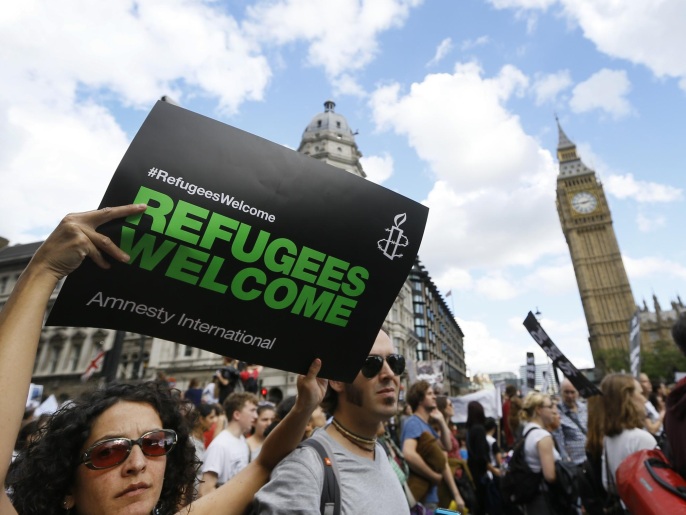LONDON
- The British government's decision to deport asylum seekers to Rwanda has raised a lot of controversy and fears about the fate of those who arrive in the United Kingdom seeking asylum, only to find themselves on a deportation plane to Rwanda.
The agreement signed between the British Home Office and its counterpart in Rwanda raised many questions about this new plan to deport asylum seekers to Rwanda, and how this plan will be implemented and the category that it will include.
In the following paragraphs, there are answers to some of the questions raised about this new plan, which puts the future of refugees in Britain at stake.
Who are the refugees to be deported to Rwanda?
The first target group of this plan is: Adults under the age of 60 who arrived in the country alone without their families or children.
According to the new amendments to the immigration law, any person who arrived on British soil by sea, land or air without an entry permit, according to the law, has arrived illegally, and therefore can be deported to Rwanda.
But before being deported, an asylum-seeker will be interviewed to determine the strength of his file, and then the Ministry of Interior will decide whether to keep him in the country or deport him to Rwanda.
How can I submit an asylum application according to the new amendments?
According to the Nationality and Borders Bill, which is still being debated in the House of Lords, asylum applications must be made from the country where the person is located, without the need to arrive in Britain.
In the event that he left his country due to an armed conflict, he can apply for asylum from the first safe country he arrives in without reaching British soil.
All of these measures are intended to reduce the number of migrants arriving in the country via the sea channel between Britain and France, which the British government says could reach 1,000 people a day.
Does the asylum seeker have the right to refuse the decision to deport him to Rwanda?
Legally, there is no obligation for the government to grant asylum seekers the right to judicially appeal the deportation decision, but the government says that everyone against whom the deportation decision was issued will have the right to enjoy 5 days to prepare their file and present it to the Interior Ministry committee, during which time they will have the right to Legal advice.
When will the implementation of this plan begin, and how many people will it include?
According to British Prime Minister Boris Johnson, there is no ceiling on the numbers that can be deported to Rwanda, indicating that the matter could include tens of thousands of asylum seekers.
On the other hand, Rwanda confirmed that it has the capabilities to receive tens of thousands of asylum seekers, but in batches, as centers are being prepared to receive asylum seekers, centers that have been criticized for not providing all the conditions for a decent life.
It is expected that the process of deporting asylum seekers will begin in the coming weeks or months, as it will not need new laws, but existing legislation can be implemented.
What is the fate of asylum seekers when they arrive in Rwanda?
Immediately after they are deported from Britain, the asylum seekers will be placed in the custody of the Rwandan government, which has said it is ready to accept adult and unmarried asylum seekers, provided they do not have any legal precedents or are on security search lists.
From Rwanda, asylum seekers can submit a request for asylum to the United Kingdom, and in the event that any person commits a legal violation or felony, the Rwandan authorities will deport him to the first safe country close to Rwanda, or return him to the country from which he left.
The Rwandan authorities also say that asylum seekers have the right to move freely near accommodation centers and leave their places of residence, and the Rwandan government has hinted that they will also be granted the right to work.
Is there any legal action to stop this plan?
Several bodies working in the field of immigration and asylum have expressed their intention to file a lawsuit at the Supreme Court, to challenge this plan and show that it is inconsistent with international law and human rights conventions.
And the "Borders and Nationality" law that Boris Johnson's government is counting on to clamp down on asylum seekers arriving in Britain by sea, is still stagnant in the House of Lords, which has requested many amendments.
Legal experts expect that the Ministry of the Interior will not resort to deportation in large numbers, in order to avoid any legal confrontation that leads to the failure of the plan. On the other hand, some see it as a political plan by Johnson and his government to anticipate the local elections that the country will witness next May.
Is this the first time Rwanda receives asylum seekers?
It is not the first time, as it previously concluded an agreement with Israel that extended between 2014 and 2017, before cooperation stopped due to the failure of the scheme, and the return of many asylum seekers to Europe again. Denmark also intends to sign a similar agreement with Rwanda.

